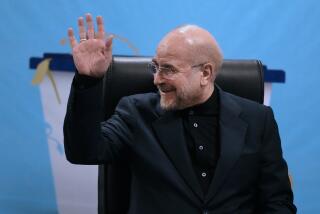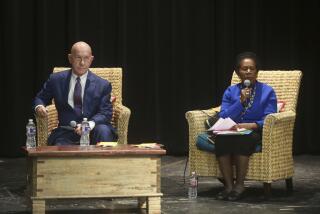Some Iraqis already skeptical of democracy
- Share via
BAGHDAD — The suicide attacks and car bombs don’t strike daily in Iraq anymore. People are venturing out at night. But that doesn’t mean voters are satisfied with their leaders.
In fact, ask them to list their most important issues in local elections Saturday, and security takes a back seat to basic services, the economy and culture, if interviews with more than 20 Iraqis across the country are anything to go on.
Some are so soured on the government’s ability to get things done, they’ve already turned apathetic in Iraq’s early days of democracy.
“I won’t participate in the upcoming elections,” said Nahar Fakhri Sadoon, 58, of the southern city of Basra. “What happened in the past is the best proof. We challenged the enemies and the security situation, yet regrettably, those we voted for didn’t give us the simplest things, and that is services.”
Election officials say interest is running high, citing the fact that more than 14,400 candidates are competing for just 440 seats. About 14.8 million of Iraq’s 28 million people have registered to vote in the 14 provinces holding elections, compared with the 15.5 million in all 18 provinces who registered in the 2005 elections.
“In the last elections, large numbers of Iraqis were not believing in the political process,” said Judge Qasim Hasan Abodi, head of Iraq’s Independent High Electoral Commission. “So this reflects the growing awareness and confidence in the political process and that democracy-building is on its correct path.”
But Iraqis said it is difficult for them to have faith in government when they don’t see it working for them. In the nearly six years since the U.S. invaded Iraq, the government has been unable to fix major infrastructure problems, leaving the majority of Iraqis without reliable running water and continuous electricity.
The Pentagon’s latest quarterly progress report to Congress, released this month, indicates that the lack of essential services has replaced security as the most important concern for most Iraqis. And unemployment remains high, with Iraqis seeing little or no improvement in their personal economic situations, the report states.
In a nationwide survey, only 16% of Iraqis reported being “somewhat” or “very” satisfied with the amount of electricity they were receiving.
At Abu Abdullah’s home in the Yarmouk neighborhood of Baghdad, the electricity had been out for a week and the water pressure was so weak he couldn’t flush the toilet or take a shower.
“It’s very, very, very weak water pressure, if not absent,” said Abu Abdullah, 52, a mechanical engineer. “These are things in touch with your everyday life. . . . At least what I want to see in the future is that we return to the same level of infrastructure as before 2003.”
Samira Jaaz, 43, a high school teacher in Basra, agreed. Now that there is security and more stability, she said, “the government has no more excuses for not providing services.”
Some candidates have tapped into the discontent. Eye-catching posters for politicians running on the secular slate of parliament member Mithal Alusi show a boy drinking water through a white pipe from a dirty water source. And posters for another slate promise “to make sterilized water reach every house.”
Many Iraqis also cited corruption as an ongoing problem in Iraq. Leaders rise to positions they don’t deserve and relatives are awarded lucrative contracts, several said.
Amir Mohammed Ali, 55, a retired army officer, said corruption was one of his chief concerns.
“The government doesn’t hold accountable those who are corrupt in the state institutions,” Ali said, adding that it should hire new Cabinet ministers and inspectors from outside the mainstream political blocs. “The corrupt people should be put on trial and not appointed to any position.”
Although the elections are for provincial councils, voters are likely to make their choices based on the party or slate’s national performance. That worries Sheik Fatih Kashif Ghitaa, director of the Al Thaqalayn Center for Strategic Studies in Baghdad.
Ghitaa said the parties are confusing voters all over the country by attaching photos of some of Iraq’s most well-recognized politicians, such as Prime Minister Nouri Maliki, instead of making a greater effort to educate them about the local candidates.
“This is an underestimation of the Iraqi citizen and voter,” Ghitaa said. “In 2005 and 2006, the brains of voters were washed with a religious mentality. . . . Now, it’s washed with the performance of the government -- either negative or positive.”
Ghitaa said his polling has also shown that most voters, particularly those in central and southern Iraq, are seeking personal benefits.
“They’re asking, ‘What can this candidate do for me?’ ” Ghitaa said. “We don’t see patriotic or principled behavior -- just beneficial behavior, which is an unfortunate thing that’s now happening in Iraq.”
Khazraji Ali, 35, who runs a clinic in the southern city of Diwaniya and teaches at a medical school, said that’s the same question he hears from patients and friends -- even the well-educated ones.
“We just came out of dictatorship,” said Ali, who spent much of his childhood living in Britain. “We need political and ideological maturity. . . . When I think of who I’m going to vote for, I think, ‘What’s their program? What is their background? What are they talking about?’ ”
But Ali said most of the people he knows plan on voting for a friend or relative who can benefit them once in office.
“We haven’t had a true political experience in Iraq,” he said. “It’s always been one government, one dictatorship. Everything the government says goes. No one has been asked what they think of anything.”
Ali said he believes that real democracy will take a decade to develop.
“At least,” he said.
--
Yoshino was recently on assignment in Baghdad.
Times staff writer Ali Hameed and special correspondents in Baghdad, Basra, Najaf and the provinces of Nineveh and Anbar contributed to this report.
More to Read
Sign up for Essential California
The most important California stories and recommendations in your inbox every morning.
You may occasionally receive promotional content from the Los Angeles Times.











